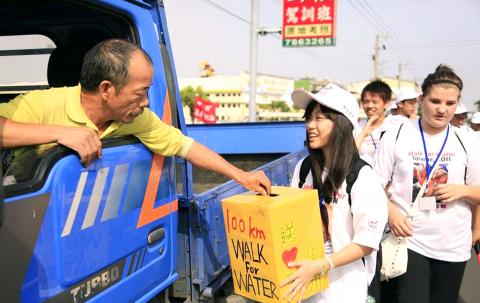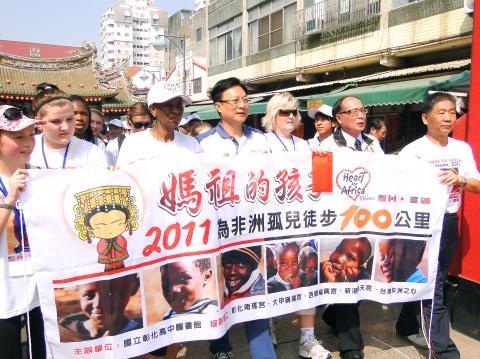In the eyes of Janine Maxwell, a renowned charity worker dedicated to helping children in Africa, Taiwan is a “unique” country.
“Taiwanese people are so unique. You are such a unique country. I travel all over the world and I have never met people like Taiwanese people,” Maxwell said in an interview with the Taipei Times on Oct. 29.
People in Taiwan have very tender hearts, she said, adding that “when I speak to students and parents, they are very truly concerned about what’s happening in other parts of the world. They don’t know about it, but they want to immediately know: ‘What can I do to help?’”

Photo courtesy of Heart for Africa
Maxwell was in Taiwan for the “100km Walk for Water,” a fund-raising event for clean water in Africa, which was organized by Changhua Senior High School librarian Lewis Lu (呂興忠) and his students and included students from six counties, taking place in four central Taiwan counties from Oct. 24 to Oct. 28.
During her stay, she also delivered speeches to senior-high students.
“I have never seen anything like this before. The students walking with the [donation] boxes and people pulling up on their mopeds, they said ‘Stop, stop, stop,’ telling us to stop so that they can put money in. That’s incredible,” she said.

Photo courtesy of Heart for Africa
Maxwell, who had previously visited Taiwan after she met Lu in 2008 when he was with a group of his students volunteering in Swaziland, said she “hasn’t met anyone in Taiwan who tried to discourage her.”
“But in America, yes. In Canada, yes, and in Swaziland, yes,” she said.
People who poured cold water on her efforts often gave her reasons like “the government should do it or someone else should help;” “if you only help a few children, it’s not enough;” and “everywhere in Africa is corrupt, so you are just helping corruption,” she said.
She said she managed not to get frustrated by the sometimes “very negative” and “mean” comments and to keep doing what is right because of her beliefs and her faith in God.
The biggest challenge in volunteering in a country like Swaziland is “seeing how big the problem is” and feeling that “[we] can’t do enough to fix the situation,” she said.
“There were times that I saw volunteers take off their shoes and clothes for the kids before they were leaving the country. We all wanted to do more,” she said.
Born in 1963, Maxwell worked in the business world for 16 years, leading ONYX Marketing Group, then one of the most successful marketing companies in Canada, which she founded at the age of 24, and which boasted a blue-chip client list in North America.
The day she happened to be in New York and experienced the Sept. 11, 2001, terror attacks sent her into deep reflection about her purpose in life and her search brought her to Zambia and Kenya in 2003.
The trip changed her whole life.
“I met so many young children, three years old, four years old, five years old ... They live on the streets. They were raped every night, they were sex slaves, they were eating from garbage cans, they were being beaten by the police and they were being treated like garbage,” she said. “I couldn’t go back to my nice world, in my nice big house, my car and all the things I have, knowing that those children whom I had gotten to know were still there. I just felt that, as a Christian, God has given me many things.”
After the trip, Maxwell decided to shut ONYX down and established the non-profit organization Heart for Africa, focusing on bringing hope to the people of Africa in the areas of hunger, orphans, poverty and education.
Heart for Africa has been working alongside churches in Swaziland to deliver quality shelter, food, water, clothing, healthcare and education to orphans and vulnerable children in the country with the world’s highest known rate of HIV/AIDS.
Maxwell said she has the feeling that “I can do something for someone other than me.”
That feeling was also the motivating factor for Lu and his students to volunteer in Swaziland since 2008 and is behind 100km Walk for Water.
As a teacher, Lu believes the purpose of education is not just helping students pass entrance exams, but helping them learn “the core values with which they live their lives.”
Starting in 2006, Lu held annual international conferences that invited international students to share their volunteering stories with local students.
Two years later, he went beyond that, persuading entrepreneurs to provide funds for students to volunteer in Swaziland during summer vacations, forming the country’s first overseas volunteer corps composed of senior-high students.
“Reading is useless unless it is for action, because reading is not an end, but a means to achieve the end, which is to change the world by turning knowledge learned in books into actions to help people,” he said.
That quote by Lu was cited by Maxwell to encourage people to do something to make a difference in her book Is It Okay with You? that contained a chapter about Lu and his team.
After their chance encounter in Swaziland, Maxwell and Lu cooperated to turn their common beliefs into actions.
Last year, the US-based Heart for Africa established a sister organization in Taiwan.
The latest cooperation, 100km Walk for Water, aimed to collect donations of between NT$2 million (US$66,000) and NT$8 million a year for Heart for Africa to build wells for Swazis without access to clean water and to provide water for irrigation of cornfields and fish farming to improve nutrition for people in the country.
During the five-day march that launched the yearlong fundraising campaign, the students collected about NT$350,000, Lu said.
“When the kids counted how much they collected at the end of the day, they were so happy they walked under the scorching sun all day and got about NT$20,000 or NT$30,000. No one would do this if the money were for his or her own personal use,” Lu added.
More importantly was that the students have learned that “to help needy people, they can humble themselves before others,” he said.
Another important lesson for the students was that they should not look down on working-class people after seeing people like truck drivers, laborers and peddlers donate without hesitation the money they have in hand, probably what they earned that day, “which surprised the students a lot,” Lu said.
Kevin Hsieh (謝凱年), who is in his first year of senior-high school, said he was really touched when an elderly woman at a fruit stand in Changhua County not only made donations to them, but also offered them lots of fruit.
“There were times we were rejected, but there were also moments that made me feel so emotional,” he said.
Because Heart for Africa is in full swing with a land development project on a 1,012 hectare plot of land in Swaziland — a multi-faceted initiative named “Project Canaan” — the Maxwell family is set to permanently move to the southern African kingdom in May next year.
Project Canaan will give hope to vulnerable children in Swaziland by providing nutritious food, security, shelter, education and medical care and improve the lives of the rural poor by providing employment through sustainable agriculture, Maxwell said.
Asked when the project would be complete, Maxwell said: “Never, probably. It is a big, big project. We will also try to design a model so that it can be used in other countries.”
“It’s our life work,” she said.

An essay competition jointly organized by a local writing society and a publisher affiliated with the Chinese Communist Party (CCP) might have contravened the Act Governing Relations Between the People of the Taiwan Area and the Mainland Area (臺灣地區與大陸地區人民關係條例), the Mainland Affairs Council (MAC) said on Thursday. “In this case, the partner organization is clearly an agency under the CCP’s Fujian Provincial Committee,” MAC Deputy Minister and spokesperson Liang Wen-chieh (梁文傑) said at a news briefing in Taipei. “It also involves bringing Taiwanese students to China with all-expenses-paid arrangements to attend award ceremonies and camps,” Liang said. Those two “characteristics” are typically sufficient

A magnitude 5.9 earthquake that struck about 33km off the coast of Hualien City was the "main shock" in a series of quakes in the area, with aftershocks expected over the next three days, the Central Weather Administration (CWA) said yesterday. Prior to the magnitude 5.9 quake shaking most of Taiwan at 6:53pm yesterday, six other earthquakes stronger than a magnitude of 4, starting with a magnitude 5.5 quake at 6:09pm, occurred in the area. CWA Seismological Center Director Wu Chien-fu (吳健富) confirmed that the quakes were all part of the same series and that the magnitude 5.5 temblor was

The brilliant blue waters, thick foliage and bucolic atmosphere on this seemingly idyllic archipelago deep in the Pacific Ocean belie the key role it now plays in a titanic geopolitical struggle. Palau is again on the front line as China, and the US and its allies prepare their forces in an intensifying contest for control over the Asia-Pacific region. The democratic nation of just 17,000 people hosts US-controlled airstrips and soon-to-be-completed radar installations that the US military describes as “critical” to monitoring vast swathes of water and airspace. It is also a key piece of the second island chain, a string of

The Central Weather Administration has issued a heat alert for southeastern Taiwan, warning of temperatures as high as 36°C today, while alerting some coastal areas of strong winds later in the day. Kaohsiung’s Neimen District (內門) and Pingtung County’s Neipu Township (內埔) are under an orange heat alert, which warns of temperatures as high as 36°C for three consecutive days, the CWA said, citing southwest winds. The heat would also extend to Tainan’s Nansi (楠西) and Yujing (玉井) districts, as well as Pingtung’s Gaoshu (高樹), Yanpu (鹽埔) and Majia (瑪家) townships, it said, forecasting highs of up to 36°C in those areas